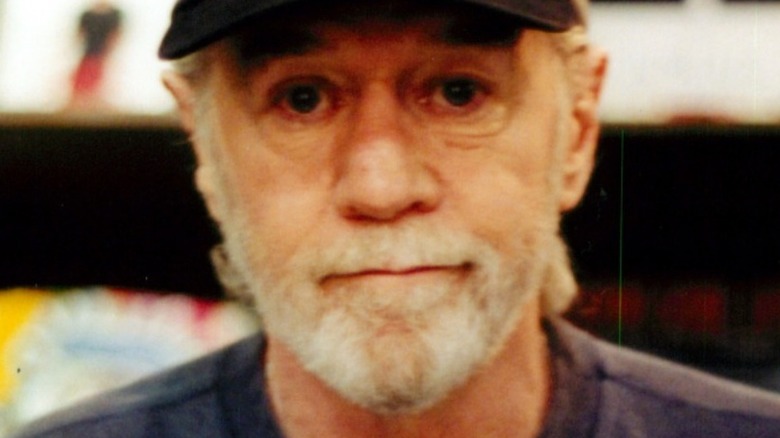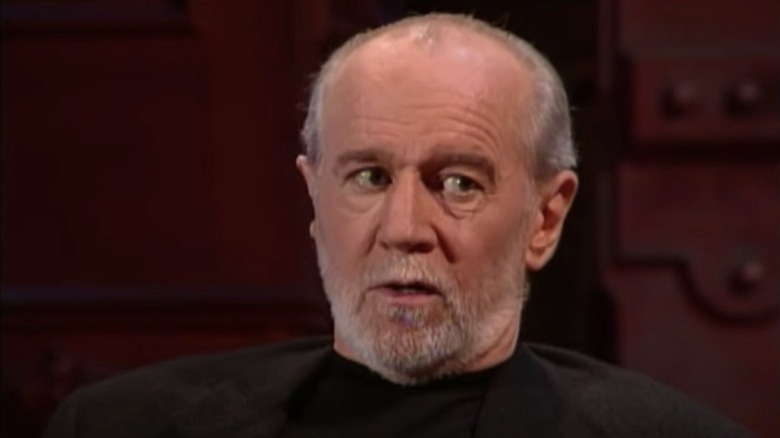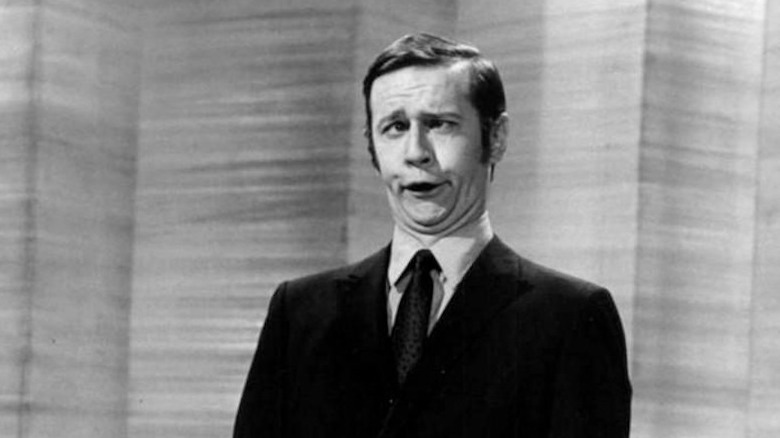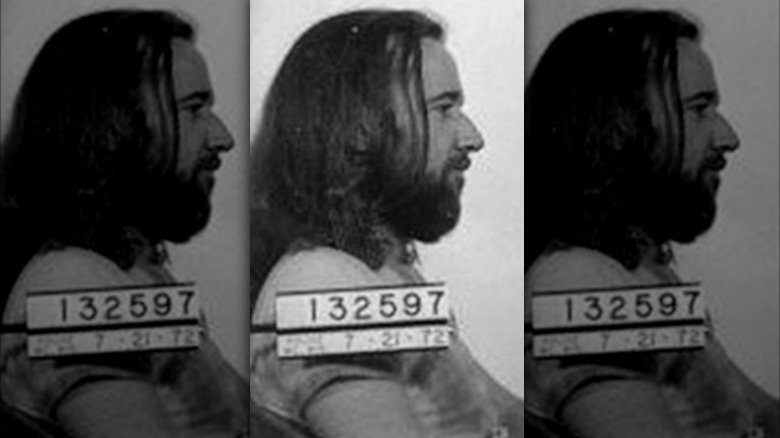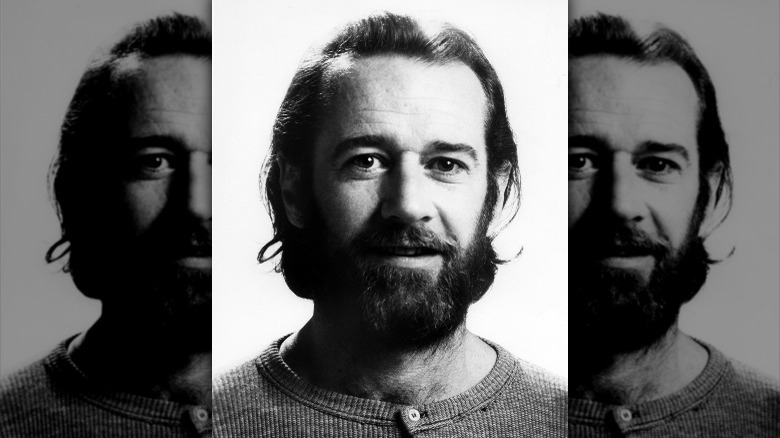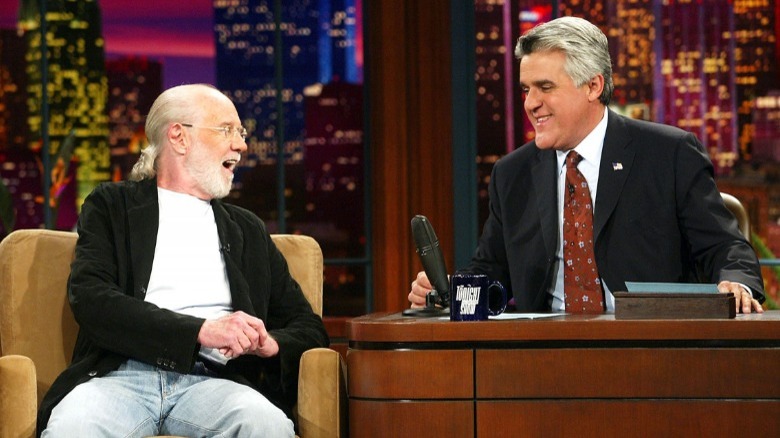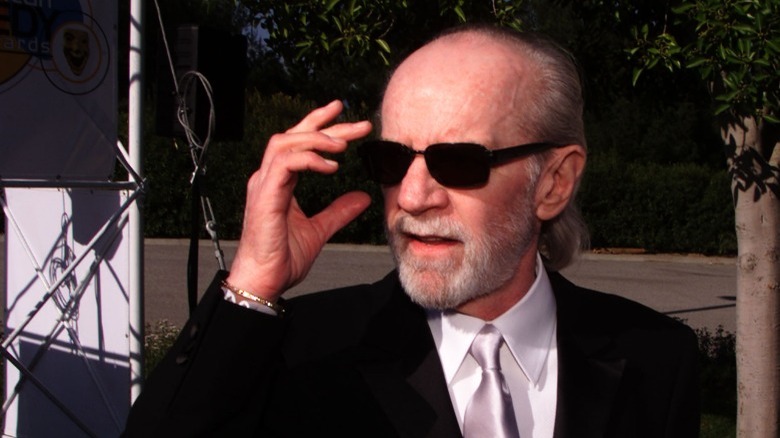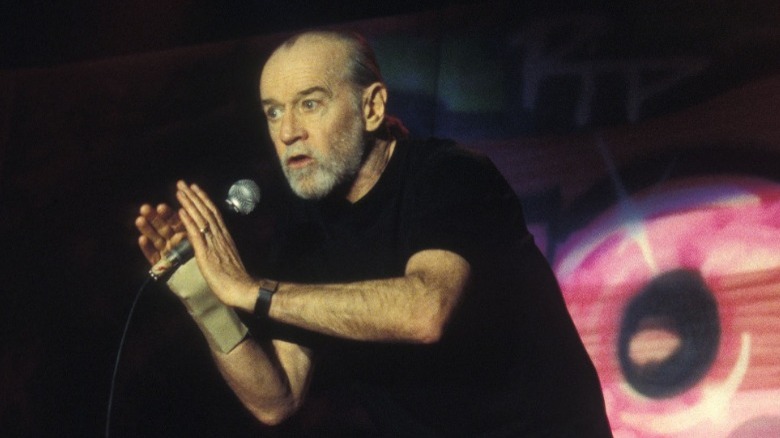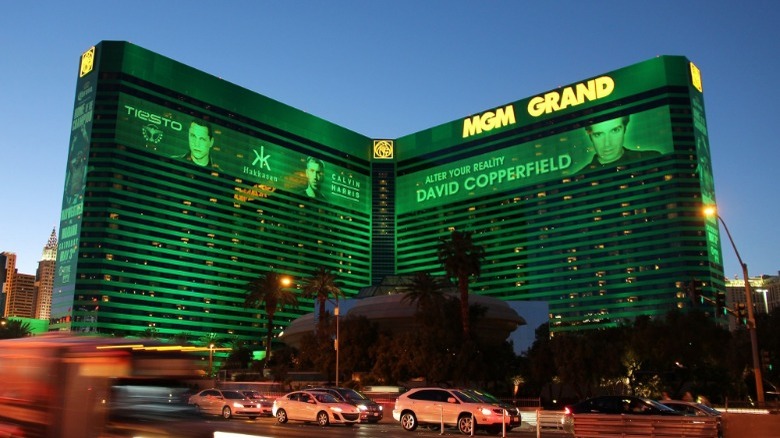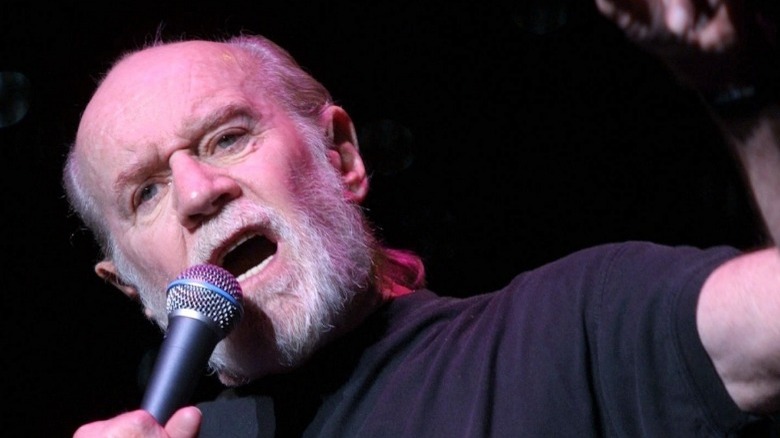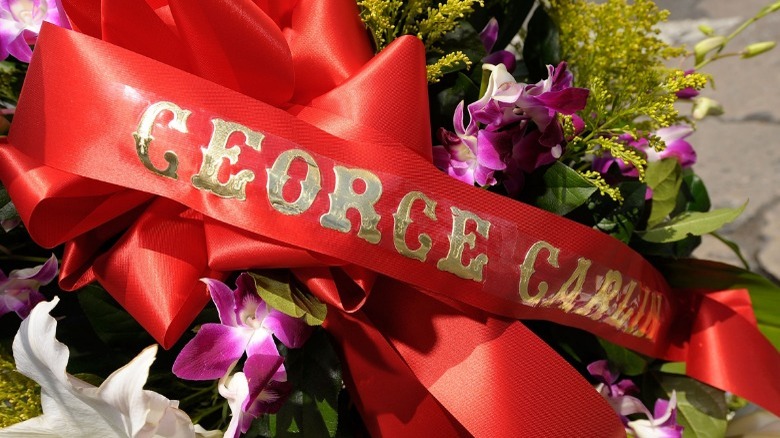The Untold Truth Of George Carlin
Described by Cleveland as "the dean of counterculture comedians," George Carlin was a stand-up comic known for his acerbic rants on religion and American culture. Irreverent and misanthropic, Carlin told Reuters, "I don't have any beliefs or allegiances. I don't believe in this country, I don't believe in religion, or a god, and I don't believe in all these man-made institutional ideas."
Many journalists and magazine editorials have recognized and celebrated Carlin's influence on comedy. Time noted how Carlin's 40-year career built upon Lenny Bruce's transgressive work and aided in making stand up comedy a hallmark of American culture.
Jim Windolf of the New York Times described Carlin as a "secular preacher," adding that he was "blessed or else just overloaded with opinions on subjects ranging from the ridiculous (belly button lint) to the sublime (the existence of God)." Matthew Love of Rolling Stone went further, naming Carlin as the second greatest comedian and writing a glowing summary, "Carlin was the ultimate thinking man's comic, demanding that his audiences fight from underneath the mountain of bulls*** heaped upon them by clergymen, politicians and advertisers."
Here is the untold, indulgent, and foul-mouthed truth of George Carlin.
His parents separated because of his father's alcoholism
In an interview with Jon Stewart, George Carlin explained how his parents split because of his father's alcoholism, "He couldn't metabolize alcohol efficiently." Also, in an Esquire feature, he remembered his father's violence: "For the first five years of my brother's life, my father beat him with a leather-heeled slipper. Had I been subjected to that kind of treatment, all bets are off. His absence saved my life." Despite the many beatings he inflicted on brother Patrick, his father hit his mother only once, but that was because she had four brothers and her father was a police officer, according to NPR.
However, despite his father's tyrannical behavior, Carlin's mother loved him: "The two of them were crazy about one another. According to those who knew them they were one of the great pairings of all time." It may seem that their relationship was a sad case of a genuine connection ruined by violent alcoholism, but Carlin wrote it up to his father's "terrific line of bulls***."
If you or someone you know is dealing with domestic abuse, you can call the National Domestic Violence Hotline at 1−800−799−7233. You can also find more information, resources, and support at their website.
George Carlin got his start as a 'conventional' comedian
In the 1960s, George Carlin was known for his zany parodies of TV commercials while dressed in a suit and skinny tie (via Time). He was rewarded very handsomely, earning $250,000 a year, part of which he used to buy his own private jet (via "Comedy at the Edge" and "Last Words").
However, the success of his clownish performances brought him no satisfaction. According to Salon, Carlin wrote about, "being rewarded more and more for being cute and clever and funny. But not for being George Carlin." In more self-loathing moments, Carlin wondered if he should give up any pretenses of being a serious comedian and "change my name to Jackie Carlin, buy some white shoes, gold chains, and pinkie rings."
Toward the end of the 1960s, outside of his busy schedule in frivolous movies and variety shows, Carlin began to associate himself with edgier figures such as Mort Sahl and Richard Pryor. He also became invested in political issues of that turbulent era, namely Vietnam, civil rights and, a few years later, the Watergate scandal in 1972.
He become anti-establishment in the 1970s
It was in the early 1970s that George Carlin completely changed his persona. He ditched the suit and tie for denim and t-shirts and grew his hair from a slick parting to a mid-length mop, which he complimented with a full beard (via Salon). Inspired by Lenny Bruce, Carlin thought the stand up comic should be a social commentator, rebel, and truth teller, which gave his material a strong anti-establishment bent (via Time). This new angle did not sit well with his established audience. A joke about his "skinny ass" caused Carlin to be thrown out of two Las Vegas gigs, while his Vietnam jokes at a show in Lake Geneva, Wisconsin, almost caused a riot. Also, Johnny Carson banned Carlin from his show.
Carlin's greatest controversy would be his "Seven Dirty Words" skit that cemented his infamy. According to the Milwaukee Journal Sentinel, Carlin was arrested and charged with disorderly conduct after finishing the profane sketch at the city's Summerfest event in 1972. He was released on a $150 bail and went to trial, but the case was dismissed.
However, according to Biography, a radio broadcast of the sketch in 1973 prompted a furious complaint from CBS executive John Douglas, whose influential outrage began a legal snowball that began with the Federal Communications Commission (FCC) and reached all the way to the Supreme Court. Ultimately, despite Justice William Brennan's opposition, the court upheld the FCC's right to control language in the media.
George Carlin enjoyed marijuana and other drugs
In 1971, George Carlin was arrested for possessing and cultivating marijuana. When a judge asked Carlin about his thoughts on the case, he replied, "I understand the law, and I want you to know I'll pay the fine, but I cannot guarantee I will not break this law again" (via Esquire). He was almost caught with cocaine a year later, during the Summerfest incident. Luckily for Carlin, his wife alerted him to the cops' presence so that he could discard the hard drug (via Milwaukee Journal Sentinel).
According to Reuters, Carlin became addicted to the white powder and consumed it for much of the 1970s. In her book "A Carlin Home Companion," Carlin's daughter Kelly recalled a trip to Hawaii with her parents, "The coke was running low ... Mom wanted more and argued about every trespass they'd ever committed against each other in their 14 years together. I screamed and hurled myself between them. Stop. Stop. Please, just stop this."
A Today obituary reported that Carlin kicked the cocaine habit in the 1980s through restraint and will power. However, in 2004, Carlin announced that he was entering rehab: "I'm going into rehab because I use too much wine and Vicodin." He wrote in "Last Words," "I was up to a bottle and a half and five or six Vikes a day."
If you or anyone you know is struggling with addiction issues, help is available. Visit the Substance Abuse and Mental Health Services Administration website or contact SAMHSA's National Helpline at 1-800-662-HELP (4357).
He embarked on an acting career
In his memoir "Last Words," George Carlin wrote how he had viewed acting as the "Holy Grail" of his career. However, his first acting gig in "That Girl" was something of a personal disaster, "I was absolutely at sea, completely lost. Whatever competence I may have had going in had vanished. I floundered. I fluffed lines. I tried to do everything I'd been told at the same time. I was failing!"
However, the ensuing years would see Carlin appear in films such as "Car Wash," "Bill & Ted's Excellent Adventure," and "The Prince of Tides." He also narrated the U.S. version of "Thomas & Friends" (via IMDb). Carlin realized that acting would only ever compliment his comedy rather than replace it, "The old movie dream wasn't dead. It was just deferred. When my comedy exploded, I saw that by putting the movies aside, I'd make room for the comedy to become what it did. At the same time, the movie thing still had its appeal. Acting had a different set of rewards."
He was happy to get out of 'The George Carlin Show'
George Carlin starred in "The George Carlin Show," which ran from 1994 to 1995. According to Vulture, Carlin said that he had "always resisted doing a sitcom" because he was "afraid of being in a living room with children who were smarter than I." However, these were jesting remarks, for after the series was cancelled, Carlin wrote, "I had a great time. I never laughed so much, so often, so hard as I did with cast members Alex Rocco, Chris Rich, Tony Starke. There was a very strange, very good sense of humor on that stage" (via "Last Words").
Despite this, Carlin had major reservations about the leadership, "The biggest problem, though, was that Sam Simon was a f***ing horrible person to be around. Very, very funny, extremely bright and brilliant, but an unhappy person who treated other people poorly." Carlin wrote that Simon was part of a "producer-writer in group culture" that held older showbusiness figures "at arm's length." He was even annoyed by the catering, which included everything from Italian and Mexican to Chinese and a deli shop. As varied and delicious as that may have been, Carlin considered it a distracting ritual. Then there was the show's creative process, which he summarized as being blighted by, "Groupthink that prevents full expression."
Despite the on-set difficulties, the show is remembered well on Rotten Tomatoes. Ramsay Ess of New York Magazine wrote that it is, "A tidy little package, elegantly designed to give Carlin's comedy a narrative stage."
He claimed drugs and the IRS made him a better comedian
In an interview with Esquire, George Carlin said that drugs caused him to neglect his business affairs and get into large arrears with the IRS. To rectify his financial issues, Carlin had to abandon his fledgling acting career and hit the road as a stand up. He said, "It made me a way better comedian. Because I had to stay out on the road and I couldn't pursue that movie career, which would have gone nowhere, and I became a really good comic and a really good writer."
Writing was very important to Carlin. He told the Paley Center for Media that he was proud of writing his own material, adding that the pressure mounted by the IRS caused him to "handle the language better than I ever had before." It was during this period that Carlin realized he was not a comedian who writes but a "writer who performs his own material."
George Carlin was fired after insulting his Las Vegas audience
In December 2004, George Carlin finished his four-year residency at the MGM Grand in Las Vegas by showering scorn on his audience, "People who go to Las Vegas, you've got to question their f***ing intellect to start with. Travelling hundreds and thousands of miles to essentially give your money to a large corporation is kind of f***ing moronic. That's what I'm always getting here is these kind of f***ing people with very limited intellects." His tirade got so personal that a woman in the audience shouted, "Stop degrading us!" (via Las Vegas Review Journal).
However, despite his contempt for Las Vegas, Carlin moved to the Stardust Resort and Casino in February 2005. A review of his performance there in the Las Vegas Sun suggested that Carlin was even angrier in this new venue, castigating his audience and even having patrons thrown out, "Your name is not on the ticket, so shut the [expletive deleted] up, would you please? Just laugh or go home or don't do anything ... I don't need the [expletive deleted] comments."
Yet even his residency at the Stardust was not his final appearance in Sin City. Carlin explained to the Los Angeles Times that regular Vegas shows allowed him to exercise his routines and deliver better HBO specials. The main downside to this, he explained, was that "The audiences are not the best ... In Las Vegas, often I get people who saw me on 'Leno' or got a coupon. It doesn't work easily."
He did a sketch about a plane crash the day before 9/11
On September 9 and 10, 2001, George Carlin was in Las Vegas performing material that would feature in his upcoming HBO special, "I Kinda Like It When a Lotta People Die" (via The New Yorker). In a remarkable case of irony, Carlin joked about Osama Bin Laden and an exploding plane, although the cause of the explosion wasn't a suicide attack but ... flatulence. Carlin joked, "These planes get flying so fast that all the most vicious, lethal, volatile, flammable, unstable farts get pushed toward the back of the airplane, where they begin to build up pressure ... finally some kid turns on a Game Boy and boom! The whole back end of the plane blows off. And you know who gets blamed? Osama bin Laden."
Later in the performances, which were shelved for some 15 years, Carlin joked that when a fatal disaster occurs, he is "always rooting for a really high death toll." This outrageous gag was a comment on the media's relentless coverage of such events, which he believed was a reflection of humanity's fascination with death and destruction.
Despite Carlin's flair for controversy, 9/11 caused him to revise much of the material in his HBO special. It was renamed "Complaints and Grievances" and shifted its focus away from terrorism and onto people who annoyed Carlin, such as gun nuts and men called Todd.
George Carlin suffered from heart problems
In 1978, George Carlin was driving his daughter to school when he noticed his jaw felt tight, which he knew was the symptom of a heart attack (via "Last Words"). After several days of tests, it was confirmed that he had suffered a myocardial infarction. This was followed by heart attacks in 1982 and 1991, according to American Dissidents. Carlin wrote in his memoir that he had another, smaller heart attack in 1994, which he believed was related to the attack in 1991.
Carlin discussed the issue with his usual humor, telling an audience in the mid-1980s, "I lead Richard Pryor in heart attacks 2 to 1." Unfortunately, it ran in the family. In December 1945, his father died of a heart attack aged just 57 (via "Last Words").
Carlin had numerous surgeries to manage his condition, including two open-heart surgeries during the 1980s, according to the Los Angeles Times. He also had an ablation surgery in 2003, which he described as "a kind of tune-up. Your heart's not firing properly and needs adjustment" (via "Last Words"). Sadly, Carlin died of heart failure on June 22, 2008. He was 71. Tony Hendra, co-author of Carlin's memoir "Last Words," wrote, "Unlike many of his peers, he died uncorrupted, uncompromised and unbowed."
